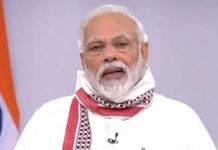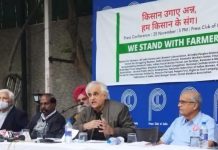Lal Krishna Advani
 Harinder Baweja, Editor, News & Investigations
Harinder Baweja, Editor, News & Investigations
THE SHADOWS are lengthening and as the political sun sets into the dark, foreboding clouds, LK Advani, already 81, must surely be revisiting his 986-page autobiography — My Country My Life — he released only last year. He would certainly be turning the pages of a chapter called, ‘Defeat in Polls [2004], Turmoil in Party’. The chapter is candid and reveals what defeat did to the grand charioteer of Indian politics five years ago. He writes: “Why did we lose the parliamentary elections in 2004?… that question haunted my colleagues and me for a long time. The taste of bitter defeat is by no means unfamiliar to me. Indeed, for most part of my political life in the early decades, defeat was the norm and victory an exception. This, coupled with my innate nature of reacting to any situation with restraint and moderation, had prompted me to develop a rather philosophical attitude towards the outcomes of elections — neither to get depressed by defeats, nor to let victories breed boastfulness. Nevertheless, the results of the 2004 polls affected me more deeply than any other setback in the past…”
 The philosophical attitude helped him journey along for a bit, but what Advani did not know in 2004 was that he would once again be affected very “deeply”. That happened soon enough; the very next year when he visited Pakistan and made a speech praising Mohammad Ali Jinnah at his mausoleum in Karachi. His book, once again, gives an insight into what the old man of Indian politics must be currently thinking, now that he has lost the American presidential-style campaign he ran in the hope of making it to the top job. Back in 2005, his party openly bayed for his blood and he was forced to step down as the President of the BJP, a party that he had singularly guided and taken from only two seats in Parliament in 1984 to 182 in 1999. Of the Jinnah controversy, he wrote, “The turmoil began when I was still on Pakistani soil… the ensuing developments affected the cohesion within the party in an unprecedented manner and confused the minds of millions of supporters. They brought me pain, deep and unyielding. This was quite simply the most agonising moment of my political life, more distressing, indeed, than when I faced corruption charges in the ‘Hawala’ episode in 1996. At that time, my mind was at peace because my party had stood solidly behind me… In contrast, in the 2005 controversy over my Pakistan visit, several of my own party colleagues chose not to support me…”
The philosophical attitude helped him journey along for a bit, but what Advani did not know in 2004 was that he would once again be affected very “deeply”. That happened soon enough; the very next year when he visited Pakistan and made a speech praising Mohammad Ali Jinnah at his mausoleum in Karachi. His book, once again, gives an insight into what the old man of Indian politics must be currently thinking, now that he has lost the American presidential-style campaign he ran in the hope of making it to the top job. Back in 2005, his party openly bayed for his blood and he was forced to step down as the President of the BJP, a party that he had singularly guided and taken from only two seats in Parliament in 1984 to 182 in 1999. Of the Jinnah controversy, he wrote, “The turmoil began when I was still on Pakistani soil… the ensuing developments affected the cohesion within the party in an unprecedented manner and confused the minds of millions of supporters. They brought me pain, deep and unyielding. This was quite simply the most agonising moment of my political life, more distressing, indeed, than when I faced corruption charges in the ‘Hawala’ episode in 1996. At that time, my mind was at peace because my party had stood solidly behind me… In contrast, in the 2005 controversy over my Pakistan visit, several of my own party colleagues chose not to support me…”
“One day in the middle of 2005, I was told that I should step down from the presidentship of the BJP… All this was profoundly agonising for me. I was in a dilemma… My predicament often made me wonder if it wasn’t time for me to embrace the peace and comfort of a quiet family life… My state of mind was not quite unlike that of the unsure Arjuna on the battlefield. But every time the thought of escapism entered my mind, I was reminded of Lord Krishna…”
Verdict 2009 has left him in a similar predicament. Only, this time, his party colleagues are not ‘insisting’ that he stay on as the Leader of the Opposition — they have merely agreed to it so the baton can be passed on without the ugly infighting waiting just below the surface.
If LK Advani had to add a new chapter to his autobiography, how would he describe the bloodbath of Vote 2009?
So, as Advani contemplates his future and draws on a philosophical attitude to analyse why Vote 2009 went so unexpectedly wrong for him and the BJP, he may just decide to add a chapter to My Country My Life. If in 2004, the chapter was titled, ‘Defeat in Polls, Turmoil in Party’, this time, it could well be titled, ‘Drubbing in Polls, Bloodbath in Party’, and it will read as follows (many in the party would probably like him to title it ‘Why I Lost’):
“In 2004, no single factor of nationwide relevance accounted for the electoral outcome. Rather, different factors influenced the electorate in different states. Thus it was not a national verdict, but an aggregate of state verdicts. The phraseology of ‘Feel good factor’ and ‘India Shining’ hurt us. This time, the party and the Sangh Parivar vested faith in me and announced my name as the BJP and NDA’s prime ministerial candidate. I accepted the challenge with humility and, aware of the enormous task at hand, went about my work diligently, addressing meeting after public meeting in the blistering sun.
 It pains me deeply to see that the BJP is down to 116 seats from 138 in 2004, and I am aware that many of my senior colleagues are now blaming me for running a presidential-style campaign and for attacking Manmohan Singh for being a weak prime minister. The fact of the matter is that for four and a half years, till he put his government on the line over the nuclear deal, Manmohan Singh was a ‘selected’ PM, a night watchman, someone who constantly went to 10 Janpath for guidance. So what was wrong if I called him weak? I am a young 82 and showed the electorate that, unlike Manmohan Singh who underwent a bypass surgery, I was fit enough to even lift weights.
It pains me deeply to see that the BJP is down to 116 seats from 138 in 2004, and I am aware that many of my senior colleagues are now blaming me for running a presidential-style campaign and for attacking Manmohan Singh for being a weak prime minister. The fact of the matter is that for four and a half years, till he put his government on the line over the nuclear deal, Manmohan Singh was a ‘selected’ PM, a night watchman, someone who constantly went to 10 Janpath for guidance. So what was wrong if I called him weak? I am a young 82 and showed the electorate that, unlike Manmohan Singh who underwent a bypass surgery, I was fit enough to even lift weights.
I ran my campaign Obama-style but the basic reason for our defeat is the limit of our geographical existence. The BJP has no hold in the important states of West Bengal, Kerala, Tamil Nadu and Andhra Pradesh, one of the reasons why TDP’s Chandrababu Naidu pulled out of the NDA.
I AM PAINED by the whisper campaign in the party that I am well past the sell-by date and therefore, in some ways, out of tune with the New India. A majority of our cadres and supporters are now sending us emails and letters and there is a sympathy factor that is building around me, but the fact remains that the electorate was unmistakably in favour of a stable government and they did not want a government which could be pulled around by smaller partners. So, on a closer examination, it is evident that if the Congress went up from 145 to 206, it is because they gained these seats in states like West Bengal and Tamil Nadu, which have a third front.
I have described the turmoil in the party over my Jinnah remark to be the most agonising moment of my political life. My own colleagues didn’t stand by me then, but what they failed to understand was that the remark had great political significance for the BJP. I had intended it as a transition point in the life of a party that was struggling with the loss of success, after the Ram temple campaign of the 1990s had lived out its sell-by date.
By then, it was clear to the BJP’s top leadership that Vajpayeeji could only be our mentor and guide and it was important, therefore, for both the party and me, to acquire a new image — an image in tune with changing India. I was trying to make the transition from being the hard, Hindutva face (maybe cultural nationalism is a better phrase), to someone who is seen as being softer, more amiable. Nobody in the party had any problems with the fact that Vajpayeeji was aloof by temperament or that he wrote poetry and enjoyed quiet evenings with his family. I am in a dilemma over why my colleagues are now saying that I have retreated into my family at the cost of the party; that my family and a few of my trusted aides (led by Sudheendra Kulkarni) ran a parallel campaign for me when there was also a campaign committee being run by my colleague Arun Jaitley, out of the same precincts — 28, Tughlak Crescent. The criticism now is that I listened more to Kulkarni’s team, which comprised of bloggers, techies and software professionals. There is a contradiction here, for those who are willing to see it — I had a high-tech team but the analysis is that I cost the BJP the youth voters.
The party as a whole should have done a political postmortem after we lost the assembly elections in Delhi and Rajasthan in December 2008. It is a matter of record that till the Mumbai attacks on 26/11, we were sure that we were on an upward trajectory. The economic meltdown followed soon after that and though I raised the issue of terrorism, there was a psychological shift towards stability (read: Congress), which none of us were able to spot.
I was making the transition from the hard Hindutva face to someone who is seen as being more amiable
Unlike in 2005, when I was in a dilemma and my mind was not quite unlike that of the unsure Arjuna, I was quick to take moral responsibility this time and offered to resign as soon as the results were out. But once again, the party is ridden with infighting. Murli Manohar Joshi lost no time in staking claim as the leader of the opposition and other senior leaders are attacking me for not disowning Varun Gandhi after he made his hate speech. Others still are saying that projecting Narendra Modi as primeminister- in-waiting was a costly mistake. It pains me the most to hear that I am the one who is ‘weak’. If I agreed with both Sudhanshu Mittal and Arun Jaitley when they came to me independently, complaining about each other, it was because I am a consensus man and I did it in the best interest of the party. I wanted to put a lid on an unsavoury controversy; cover up the infighting within the BJP, known to be ‘a party with a difference’.
Should I refuse to be the Opposition leader or bow to the wishes of my colleagues? I am in a dilemma. I have never been enamoured by any political post or the power that supposedly comes with it. I will pass the baton soon and continue to be a philosopher and a guide…”
shammy@tehelka.com













